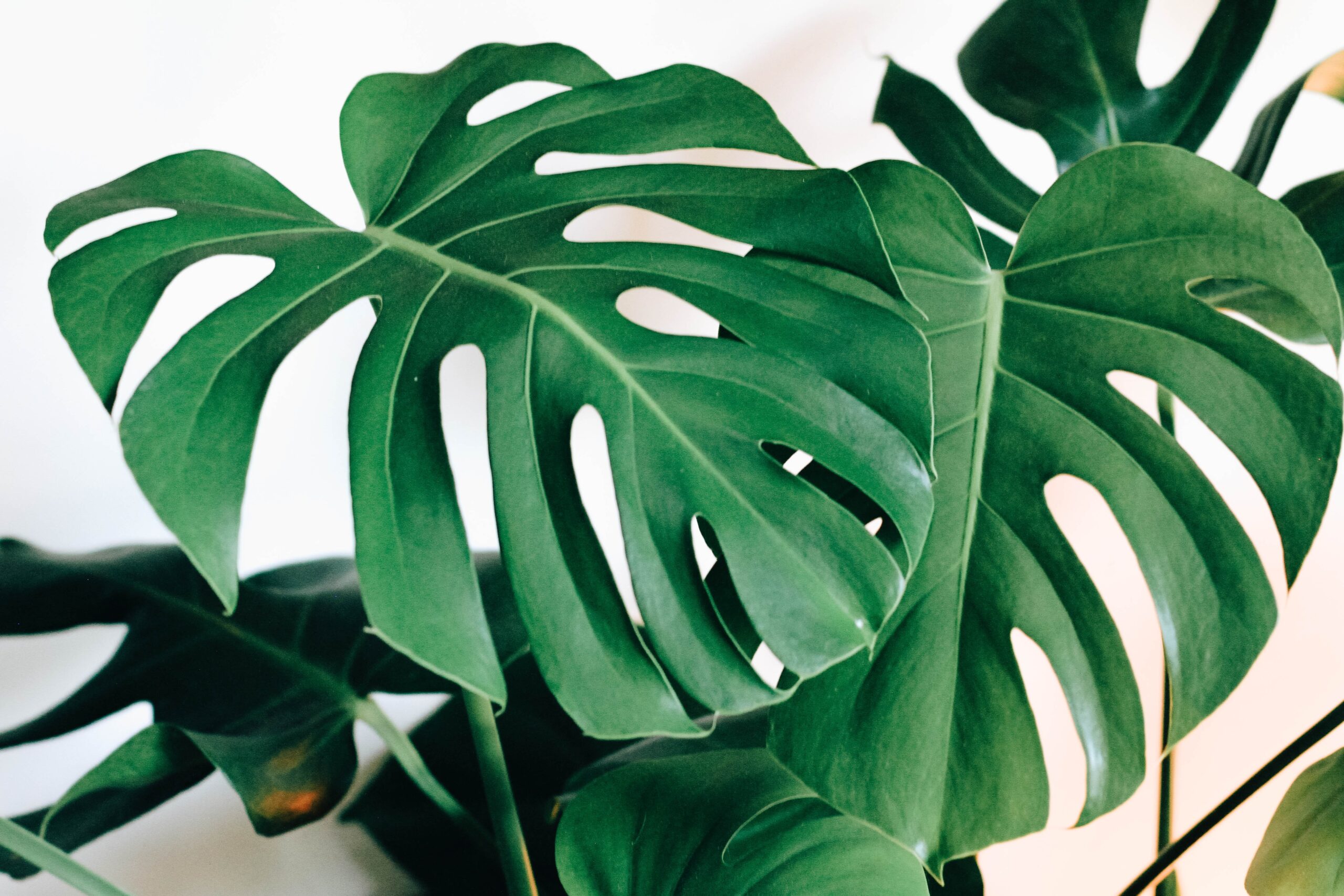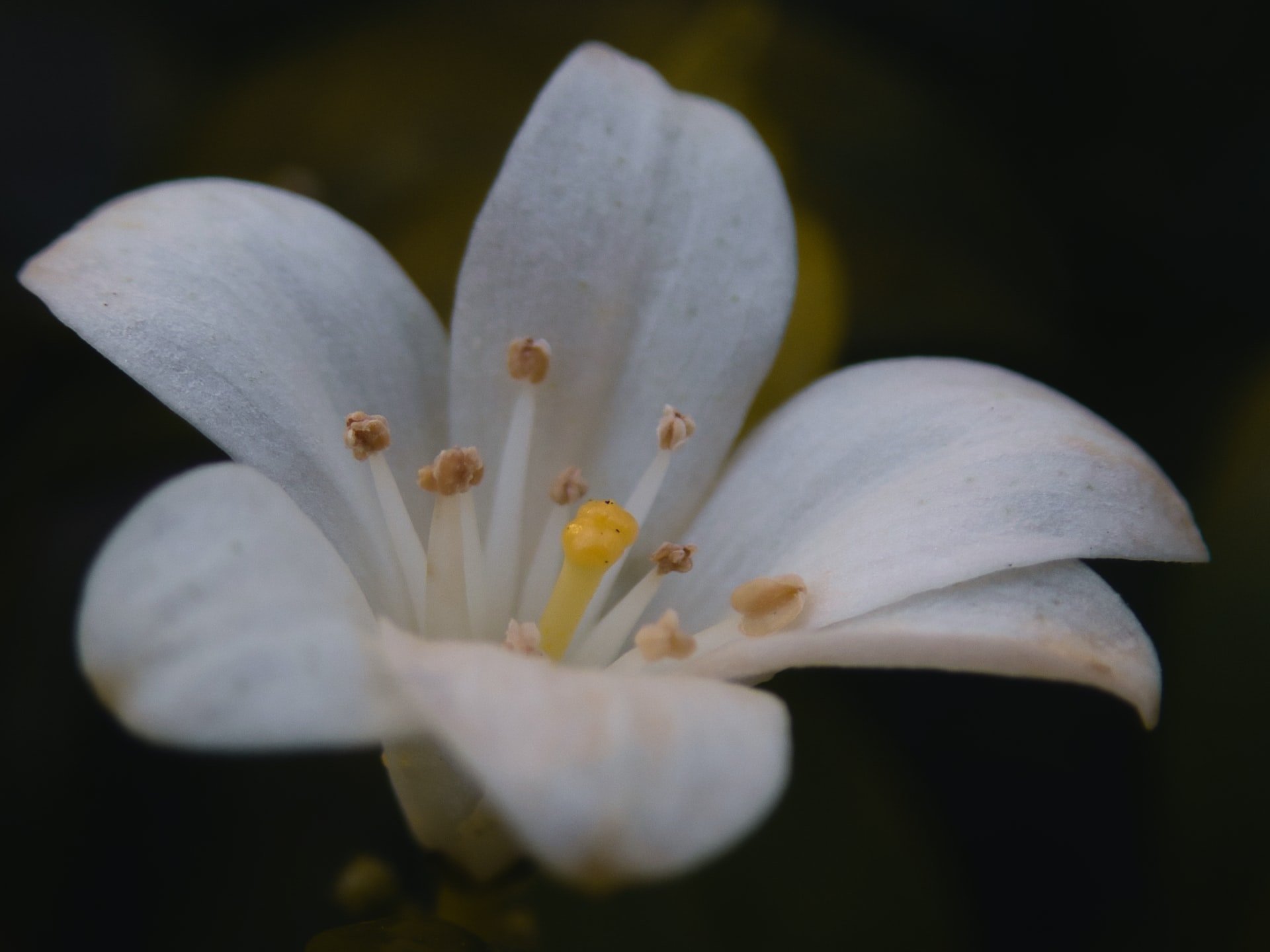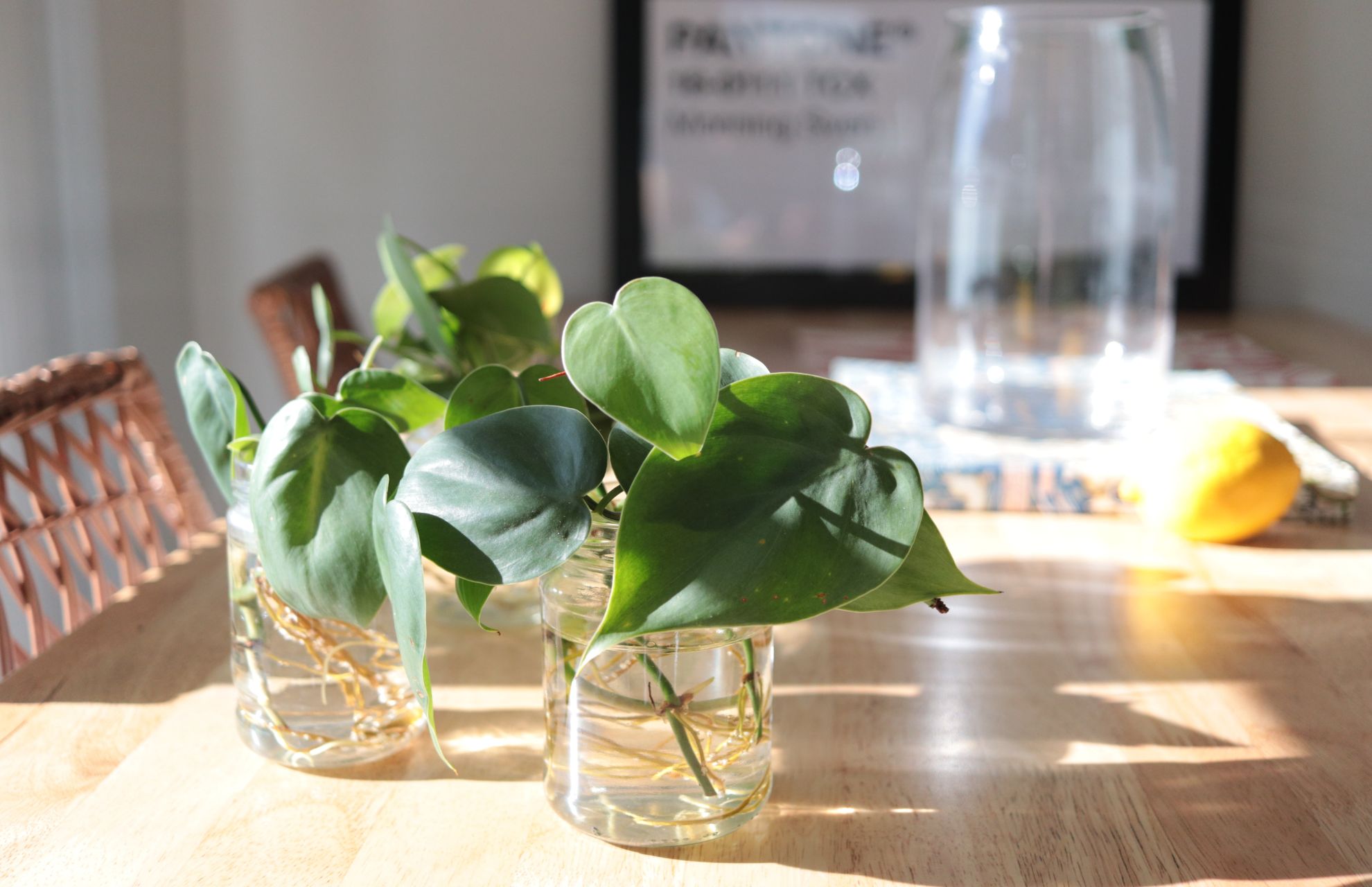The ACPA states that eating monstera plants is Toxic to cats, dogs, and people.
They contain calcium oxalate crystals in their sap, which can irritate the mouth and produce swelling, as well as vomiting, diarrhea, and other symptoms of intestinal discomfort. Where possible, keep these plants away from children and pets.
- About Monstera Plants
- How Dangerous Is Monstera Toxic?
- Are Monsteras Toxic to Your Pet Cats and Dogs?
- Is Monstera Toxic To Babies?
- Symptoms Of Monstera Poisoning
- Diagnosis Of Monstera Poisoning
- How To Keep Monsteras Away from Cats and Dogs?
- What If Cats and Dogs Nibble on Monsteras?
- How Can You Prevent Your Pets From Chewing Monstera?
- Conclusion
About Monstera Plants
A plant genus with 49 species is referred to as monstera. The Araceae family includes the genus monstera.
Monstera species differ in appearance, but they are all either climbing vines or herbaceous plants. The natural holes that cover the leaves of several of these plants are well recognized. Read: Brown Edges On Monstera Leaves: Reasons And Solutions
The Swiss cheese plant, Monstera deliciosa, and Monstera adansonii are two of the most well-liked monstera houseplants.
Due to its exotic foliage, many maintain these plants as houseplants, but under the correct circumstances, they may also produce flowers and fruits. Tropical outdoor cultivation of Monstera deliciosa plants will result in the production of delectable fruit. Although this fruit is delicious when it is ripe, eating it before it is ready might make you feel irritated.
Almost all of a monstera plant’s components are harmful when it comes to toxicity. Embarrassing calcium oxalate crystals can be found on the stems and foliage. The sap from the plant can burn skin whereas touching the leaves is less likely to irritate it.
Crystals of calcium oxalate are present in all varieties of monstera plants. These tiny crystals can irritate soft tissue, resulting in discomfort and edema.
The following monstera plant varieties are harmful to both people and animals.
- Delicious monstera
- Adanson’s Monstera
- Siltepecan monster
- Beastie dubia
How Dangerous Is Monstera Toxic?
Despite being poisonous, what effects do monstera have? Do they also poison humans?
Which Part Of The Monstera Plant Is Toxic?
All parts of the Monstera plant are poisonous to humans because they contain insoluble oxalate crystals, which also cause kidney stones, as was already mentioned. These components consist of the fruits, flowers, leaves, stems, and roots.
When consumed, calcium oxalate crystals are extremely irritating, particularly to the mouth and even the stomach. The only exception is Monstera Deliciosa fruits, which are edible for humans when fully ripe.
Are Monsteras Toxic To Touch?
While they won’t irritate your hands, Monstera can sting or irritate your lips, mouth, or tongue if you touch those areas after touching the plant. Handling these plants with gloves on or after washing your hands can help avoid an allergic reaction.
Additionally, the juice from Monstera can cause contact dermatitis or mild skin irritation. So, whenever you handle this plant, always wear gloves.
Are All Monsteras Toxic?
The 45 species of Monstera are thought to be poisonous. Meaning even Monstera Adansonii or Monstera Deliciosa (known as the poisonous (Swiss cheese plant).
Are Monsteras Toxic to Your Pet Cats and Dogs?
Though you would expect it, there isn’t a simple “yes” or “no” response to this query.
The ASPCA has designated the popular aroid houseplant genus Monstera as hazardous. It may be argued, though, that this isn’t actually the right phrase. The entire genus is classified as poisonous because of calcium oxalate crystals, which are described in greater detail below.
When consumed, calcium oxalate crystals are extremely irritating, particularly to the lips and even the stomach. Whether it’s a Monstera deliciosa, Monstera adansonii, or one of the other varieties, your cat won’t likely have a good time if it eats your Monstera. It seems like this thing may be quite uncomfortable.
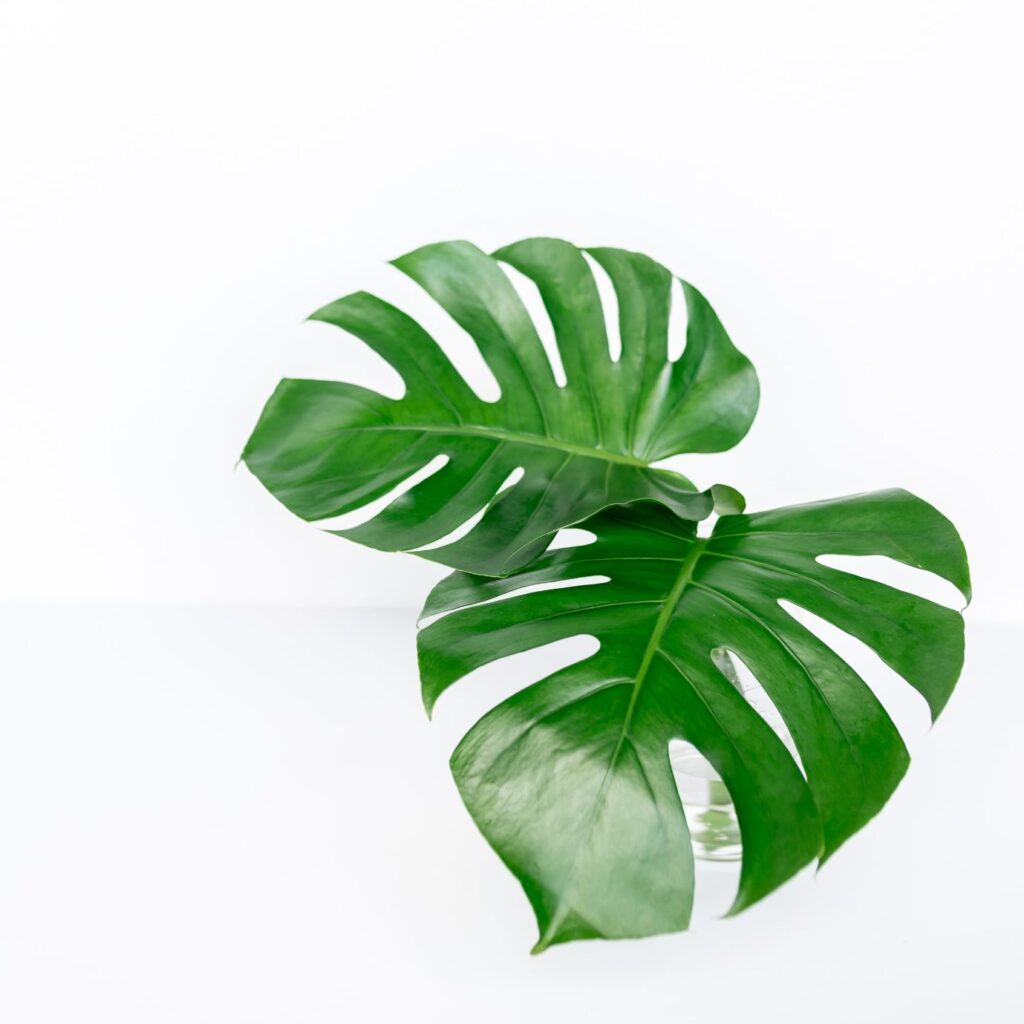
The point is, even though your cat or dog may act irritated and in pain after biting into your Monstera, it should be alright otherwise. The only actual risk arises if an unusual swelling reaction takes place. The only unpleasant sensation is on the tongue and throat region; there is no poison in its system that is progressively shutting down its body.
You may be interested in:
- Are Bromeliads Toxic To Pet Cats
- Are Fiddle Leaf Figs Toxic to Pet Cats, Dogs, or Other Animals
- Are Air Plants Toxic to Pet Cats, Dogs, or Other Animals
- Is The ZZ Plant Poisonous for Cats, Dogs, or Other Pets
- Are Venus Fly Traps Poisonous To Cats
- Are Ferns Toxic or not to Cats?
- Are Jade Plants Toxic To Pet Cats?
- Are Money Trees Toxic to Pet Cats, Dogs or Other Animals
- Are Orchids Toxic to Cats, Dogs or Other Pets
- Are Philodendron Toxic to Cats, Dogs or Other Pets
- Are Peace Lilies Toxic to Cats, Dogs or Other Pets
- Are Ponytail Palms Toxic to Cats?
- Are Pothos Plants Toxic to cats and dogs, Dogs or Other Pets
- Are Snake Plants Toxic to cats and dogs, Dogs or Other Pets
- Are Spider Plants Toxic to Cats, Dogs or Other Pets
- Is The ZZ Plant Poisonous for Cats, Dogs or Other Pets
Is Monstera Toxic To Babies?
Monsteras are harmful to infants because they contain oxalate crystals that are sharp and insoluble. It’s best to either give away or keep your Monstera plant out of reach.
Following are the symptoms to watch for when ingested:
- irritation and burning in the mouth.
- lips, tongue, and mouth are swollen.
- Drooling.
- Reduced appetite.
- swallowing issues
- throat swelling and difficulty speaking.
Call the Poison Control Center at (800) 222-1222 for additional assistance if your child ate a Monstera and displays any of the symptoms listed above.
Symptoms Of Monstera Poisoning
When the bitter taste and burning sensations on your cats’ tongues begin, they are most likely to stop eating the plant.
Typically, the sensitive tissues in the cat’s mouth can be harmed by the insoluble calcium oxalate crystals, which can result in excruciating pain and swelling.
In addition, swallowing and eating are made more difficult by swollen tongues.
The cat’s throat may also swell considerably in a critical state, making breathing difficult. Visit the veterinarian right away with your cat.
Your cat will soon start exhibiting some symptoms if they consume any Monstera parts.
- Appetite disorders
- Abdominal discomfort
- Burning sensation in mouth
- Swollen mouth
- Weakness
- Dry Heaving or Retching
In most cases, depending on the amount consumed, these symptoms will appear within minutes or hours. According to the amount consumed, these symptoms might go away in a few days.
Those symptoms could last anywhere from 24 to 48 hours or even up to two weeks, depending on how much was consumed.
When given the right medications at the appropriate time, your cat can recover from poisoning.
Diagnosis Of Monstera Poisoning
The diagnosis of Monstera poisoning must first accurately pinpoint the early signs.
But bear in mind additional typical feline issues: food poisoning or parasitic infection also exhibit similar symptoms.
Therefore, identify the primary offender before concluding that the cause is Monstera poisoning.
DIY Diagnosis
If you want to be certain that your cat ate the plant leaves or any other parts, keep an eye out for these obvious signs.
- Cat has plant matter in or around their mouth.
- The plant’s stems and leaves have shattered or been damaged.
- There are obvious traces of plant leaf nibbling on the plant.
- The plant appears to have been strangled or damaged by a cat.
- Your cat may have spit some of the plants out due to its bitter taste.
- Retching and mouth-pawing are two common symptoms your cat begins to display.
Veterinarian Diagnosis
Even though self-diagnosis may aid in determining the underlying cause, taking your cat to the vet within the first 48 hours of any initial symptoms is still crucial.
Therefore, bring your cat’s previous medical records and any plant parts that it may have nibbled on (if any) with you when you go to the vet.
Keep in mind to alert veterinarians to any toxic Monstera you may have in your residence.
They may move on to endoscopy if these procedures do not enable them to reach a clear decision.
How To Keep Monsteras Away from Cats and Dogs?
The best way to prevent your cat from eating a Monstera plant is to put it somewhere they can’t get to it. If you want to keep the Monstera out of your cat’s reach, one solution is to move it into a hanging basket and hang it from the ceiling. Another is to place the plant on a high shelf.
Noise Deterrents
You can take advantage of the fact that cats dislike loud noises to keep your feline companion away from your houseplants. Shake the bottle whenever your cat starts to bother the plant after you’ve filled it with pennies and placed it in a plastic water bottle.
After some time, the cat will start to associate the plant with the annoying noise and avoid it.
Smell Deterrents
With their keen sense of smell, cats are particularly sensitive to certain smells. One of these scents that can help prevent your cat from accessing your Monstera plants is citrus. To stop cats from chewing on your plants, you can even purchase citrus-based deterrent sprays that you can spray on the plants.
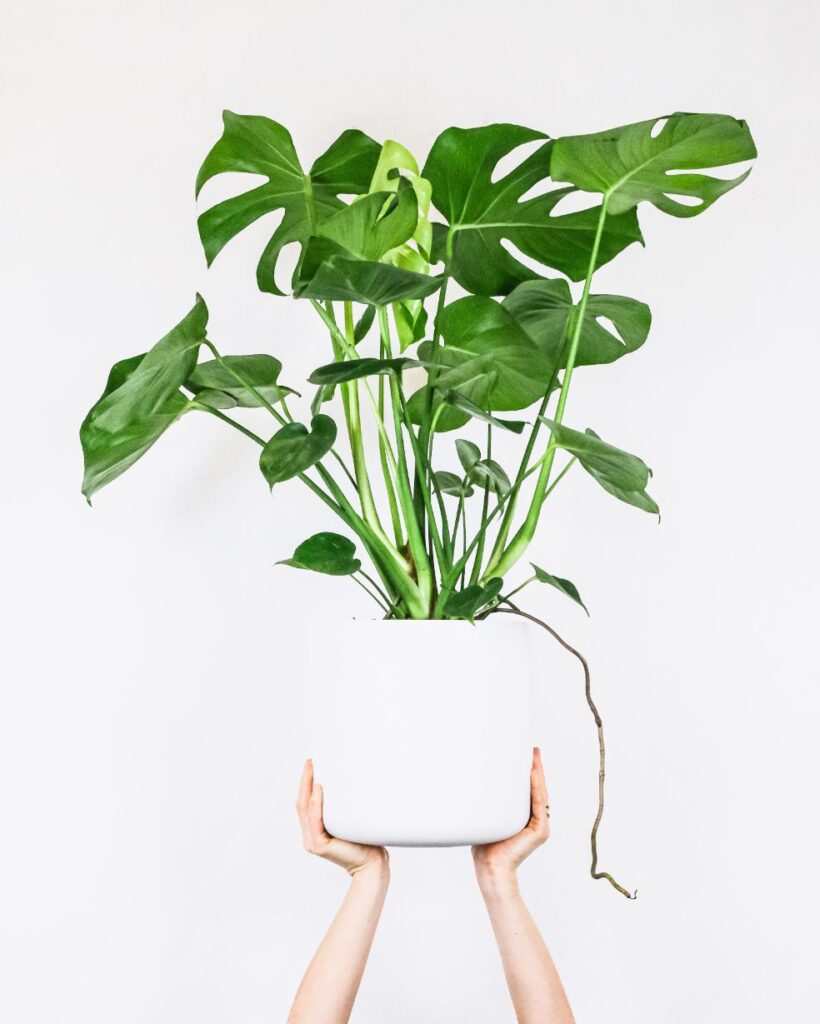
This spray that helps with cat and kitten training is ideal for this.
Feel Deterrents
Cats typically take great care not to step on anything because their paw pads are very sensitive. By enclosing the plant in aluminum foil or sticky tape (sticky side up), you can help keep them away from plants or other areas. The unpleasant surface all around the plant will make your cats reluctant to walk on it.
Cat deterrent tape is even available that is designed specifically to keep your pets out of inappropriate areas.
Enrich Their Surroundings
Most of the time, bored cats start to bother indoor plants. Make sure your cat has their own toys, and play with them every day for a while.
Try to divert your cat’s attention to a toy if you see them moving toward the plant.
Give Them Their Own Plant
There are even plants that are safe for cats to chew on that some cats like the taste of. The two most common plants that cats like to eat are catnip and cat grass, like the cat grass that is offered here.
Despite the fact that cats can safely eat these plants, you should still watch out for overeating since it can lead to stomach pain, diarrhea, and vomiting. Giving your cat safe plants in moderation is essential.
Be Consistent
You must be consistent regardless of the deterrent you select. You will have to start over if you slip up and let your cat play with the plant even just once.
Cats eventually learn to avoid the Monstera if they are consistent with their training.
What If Cats and Dogs Nibble on Monsteras?
Don’t freak out if your pet got to your Monstera and chomped it. We agreed that your animal companion will survive. So what do you do?
- Examine your pet’s mouth and the outside of it. Be on the lookout for swelling and redness. You likely don’t need to do anything if everything appears to be in order.
- Does your pet seem to be in discomfort or show signs of irritation? To encourage drinking, offer water or something more alluring. The crystals in the mouth can be removed using this. You might also attempt cleaning its mouth on your own.
- Go to the veterinarian if your pet is still obviously suffering after this or if you are concerned that the swelling may be obstructing its breathing. In addition to providing extra therapy, they could provide a painkiller. possible here.
How Can You Prevent Your Pets From Chewing Monstera?
You probably consider finding a solution now that you are aware that Monstera is harmful to cats. We have you covered, so don’t be concerned.
Limit Place Access
If your animals are ferocious plant-chewers, you should restrict access by growing plants in a lockable room that neither your dog nor cat can enter. Simply make sure it is bright enough and offers the ideal conditions for growth.
Putting your plants in cages is another way to restrict access. The best option is a glass cabinet or vivarium enclosure because your plants will still be visible and it will look nice.
It is much simpler to restrict access if you only have dogs. You can hand your Monstera or Grow pet-friendly plants
You should think about purchasing houseplants that are safe for pets if your cat or dog likes to nibble on your houseplants. An adorable one is possible to miss.
Some of the cat and dog-safe plants include:
- All genuine palms (Arecaceae), including the Chinese Fan, Areca, Majestic, Cascade, Parlor, and Ponytail trees.
- Succulents like the hens and chicks, echeveria, and Haworth. Among many others are Sedum, Graptoveria, Lithops, and Opuntia.
- All peperomias species, including Ruby, Frost, Hope, Trailing Jade, Teardrop, Emerald ripple, Rosso, String of Turtles, Rainbow, Watermelon, and Baby Rubber Plant.
- like Pinstripe, rose-painted, Freddie, Zebra plant, White fusion, Peacock plant, etc.
- Asparagus fern
- Hoya
- African violets
- Spider plants
- Hoya
- Cast-iron plant
- Baby tears
- Aluminum plant
- Prayer plants
There are countless lovely indoor plants that are safe for cats and dogs. We bet you won’t miss a striking plant that is safe for pets.
Discourage Eating
Citrus fruit odors are unpleasant to both dogs and cats. In order to prevent chewing, you can spray it on your plants. While we can’t guarantee that your plants won’t get chewed on by these animals, it will deter them.
As dogs and cats don’t like them either, you can also spray cayenne pepper on your plants. Along with other smells, they dislike the vinegar smell. Get what suits you the best after doing some research.
Train Your Pets
If you are patient and know how to train them, both cats and dogs can be trained. If you need help teaching your pets not to eat your houseplants because you are too busy, consult a professional. Why not also teach them not to eat plants if they are learning to use their smaller boxes?
Give Them Alternative Safe Plants
Giving your pets substitute safe houseplants that they enjoy is another way to keep them from consuming poisonous or toxic ones. Dogs enjoy chewing on various plants, such as grass, lemongrass, dill, fennel, and basil. Why not instead give them these plants?
But cats will eat things like catnip, cat thyme, rosemary, zinnias, marigolds, wheatgrass, etc. Think about giving them these secure plants. You could also purchase cat grass.
Have Their Health Checked
Greenery shouldn’t be consumed in excess by dogs or cats. Indigestion might result from them. Furthermore, this could be a sign that their health isn’t exactly in order. So, if your dog or cat seems to be consumed by plant-eating, consult your veterinarian. Hairballs, dietary deficiencies, stress, or your pet’s illness could all be to blame.
Conclusion
Monstera plants are simple to adore, but you should be careful of their toxicity. If consumed, the calcium oxalate crystals found in their plant sap might result in discomfort and edema. As a result, you want to keep your monstera plants away from curious kids and animals.

